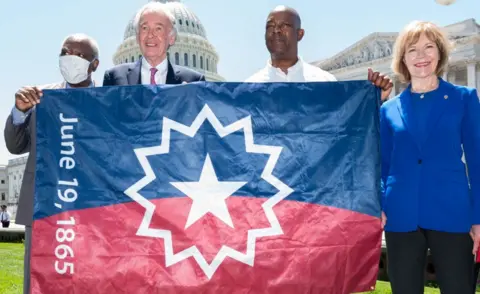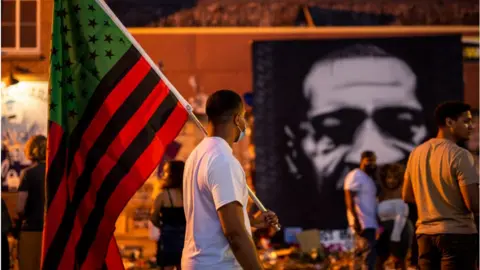Juneteenth: How the US holiday is being celebrated
A holiday commemorating the end of slavery in the US has been celebrated every 19 June since President Joe Biden signed the Juneteenth National Independence Day Act in 2021.
So what is the origin of Juneteenth, how did it become a holiday and how can you celebrate it?
What is Juneteenth?
On 19 June 1865 - months after the northern US states defeated the slave-owning South in the US Civil War - enslaved African-Americans in Galveston, Texas, were finally told they were free.
That act of liberation came more than two and a half years after President Abraham Lincoln declared all enslaved people in the rebellious states to be free by issuing the Emancipation Proclamation.
The declaration by General Gordon Granger to bring the proclamation into effect in the state of Texas is seen by many as the true end of slavery.
Why is it called Juneteenth? The word was created by joining the words "June" and "nineteenth" together.
Is Juneteenth a federal holiday?
Yes - though it took decades to happen.
Juneteenth was first recognised as a state holiday in Texas in 1980. In the years afterwards, every state but South Dakota formally went on to recognise Juneteenth as a state or ceremonial holiday.
When he was senator for Illinois, Barack Obama co-sponsored legislation to make Juneteenth a national holiday, but the law was never passed - even after he became president.
 Getty Images
Getty ImagesBut the legislation gained momentum after Black Lives Matter protests around the country in the summer of 2020.
In the lead-up to 19 June 2021, both chambers of the US Congress moved swiftly to pass the bill and - with the signature of President Biden, it became law.
It was the first new federal holiday since Martin Luther King Jr Day was established in 1983.
Among the campaigners for a federal holiday were Opal Lee, who, at age 89, walked from Texas to Washington DC in 2016 to raise awareness and persuade lawmakers.
She walked 2.5 miles (4km) each day - representing the two-and-a-half years it took for enslaved people in Texas to learn they had been freed.
Ms Lee spoke of her "many different feelings" after Congress approved the new federal holiday.
"I don't know what to call them all," she said. "I am so delighted to know that suddenly we've got a Juneteenth.
"It's not a Texas thing or a black thing. It's an American thing."
 Getty Images
Getty ImagesHow is it celebrated?
US government offices close for Juneteenth, as do any private businesses that participate.
As for whether state government employees get a paid day off - that depends on whether state authorities mark Juneteenth as a state holiday, a day of observance or something in between. It is a varied picture.
Similarly, celebrations and traditions differ across the US. In some states there are parades, festivals and block parties where people gather to share food and play games.
As well as public readings and singing, picnics and church services, in some states rodeos, contests, concerts and parades are also organised.
Food also plays an important part, with barbecues being one of the most popular ways of marking the day with family and friends.
Many people choose to shop at black-owned businesses or eat at black-owned restaurants.
Others elect to attend solemn or reflective events that call attention to ongoing racial inequality.
Why is Juneteenth important?
The ending of slavery did not end racism, and in the years after emancipation, so-called Jim Crow laws were created to separate black people from white society and limit their civil rights.
The legacy of those laws is still being dismantled.
The deaths of George Floyd, Breonna Taylor and other African Americans at the hands of police have spurred anti-racism protests.
It also comes as a cultural debate rages over the history of slavery and how it should be taught in American schools.
